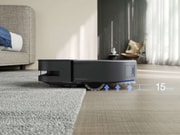Best natural way
32 Things You Should Be Cleaning with Vinegar
Cleaning with vinegar is eco-friendly and effective. Learn how to use it to keep your whole home clean—from kitchen to bedroom to bath.
If you’re desperate for an inexpensive, non-toxic, chemical-free cleaner, don’t send out a distress signal. Just open your kitchen cabinet. Chances are, there’s an unassuming bottle of white vinegar lurking in the back that can save the day! Just grab a rag or a microfiber towel and get to work cleaning with vinegar. It’ll keep your home feeling clean, smelling fresh and looking sparkly and bright. Here are a few tips for washing a microfiber towel.
Kitchen
Justin Paget/Getty Images- Refrigerator: To keep your fridge looking pristine, wipe down the shelves and walls with a 50/50 mixture of white vinegar and water. To keep it even cleaner, use these tips to organize your fridge the right way.
- Cutting Board: Germs can build up on a wood surface, so spray your cutting board at least once a week with straight white vinegar, rinse thoroughly and dry completely.
- Microwave: To clean up stubborn spatters, mix 1/2 cup each white vinegar and water in a glass bowl or measuring cup. Place in microwave and heat on high 2 to 3 minutes until it boils. Let it sit for a minute with the door closed, then wipe down the interior with a sponge or soft cloth. Stains should come right off!
- Countertops: A daily spritz and wipe with undiluted white vinegar helps remove spills, stains and odors and keeps countertops looking shiny and new. CAUTION: Do not use vinegar on granite, marble or any porous stone countertops. The acidity of vinegar can etch the stone. (Countertops too cluttered to clean? Try these simple tricks to gain more counter space.)
- Plastic Containers: Remove pesky stains and odors from plastic containers by coating them with white vinegar and letting them sit overnight. Rinse thoroughly.
- Tea or Coffee Cups: Embarrassed to have friends over for coffee because of the stains in your cups? Mix a solution of equal parts white vinegar and salt or baking soda. Scrub the cups gently and rinse.
- Fruit and Veggie Wash: Rinsing fruits and vegetable with 2 tablespoons of white vinegar added to one pint of water helps kill more pesticides than rinsing with water alone.
- Appliance Cleaner: It’s easy to remove buildup and keep your dishwasher and coffeepot running smoothly. Once a month, simply pour 1 cup of vinegar into an empty dishwasher or coffeepot and run it through a cycle.
Bed & Bath

- Mattress Freshener: Combat pesky dust mites, mildew and odors with a solution of white vinegar, a splash of rubbing alcohol and a few drops of tea tree oil. Pour mixture into a spray bottle, spritz the mattress, and allow to dry thoroughly before making the bed.
- Shower: For a sparkling clean shower, boil white vinegar and put it in a spray bottle. Spray down the walls and glass door with the vinegar, keeping everything damp by spritzing every five minutes for a total of 30 minutes. Rinse thoroughly. For stubborn mold, water spots or soap scum, soak a non-scratch sponge in white vinegar, sprinkle it with baking soda, and scrub vigorously. (Did you know you can clean your shower head with baking soda and a zip-top bag? And here’s how to wash your shower curtain liner.)
- Floor Tile: Mix 1/2 cup white vinegar with a gallon of warm water and mop floor tiles. Allow to air dry. (Do not use on stone tiles or unsealed grout.)
- Tub and Sink: Close the drain and pour 1/2 cup white vinegar around the drain. Allow the vinegar to sit for several hours, working its way into hardened deposits and soap scum. Scrub drain area with a non-scratch sponge, drain out the vinegar and rinse thoroughly. For hard-to-remove lime buildup, create a paste of 1 teaspoon white vinegar and 2 tablespoons coarse salt. Rub paste into deposit, scrub with a non-scratch sponge and rinse. (Check out must-know hacks for cleaning with salt.)
- Toilet: Everybody uses it, so here’s an easy way to keep it clean. Pour one cup of white vinegar into the toilet bowl and let it sit overnight. Sprinkle baking soda into the bowl, scrub with a toilet brush, then flush. (Here are more ways to clean with baking soda.)
- Drain Cleaner: If your drains are sluggish, pour in one cup of baking soda followed by 1 cup of white vinegar. Allow the solution to bubble and foam, then let it sit for several hours. Pour boiling water down the drain to flush the clog.
- Hair Brightener: Remove product buildup and brighten your hair by rinsing with 1 tablespoon of white vinegar from roots to ends once a month.
- Skin Softener: Keep your soles feeling smooth by soaking your feet in 1 part white vinegar to 2 parts water. Scrub gently to remove rough spots.
Laundry

- Fabric Softener: For a chemical-free fabric softener, add a cup of white vinegar to the final wash or rinse cycle. (Adding even 1/2 cup of white vinegar to the wash cycle helps keep dryer lint from sticking to your clothes and helps reduce static cling. And here are unexpected uses for dryer sheets that aren’t laundry-related.)
- Deodorizer: Dealing with stinky gym socks? Add 1 cup of white vinegar to a large pot of water. Bring the mixture to a boil. Remove from heat and submerge socks completely. Soak socks overnight, then wash and dry as usual.
- Scuff Remover: Reduce the appearance of scuff marks on your shoes or handbags and restore their natural shine by wiping them down with white vinegar. ( Don’t forget to clean your top-loading washing machine while you’re on the cleaning spree.)
Living Room

- Glass Cleaner: To remove fingerprints, smears and water spots from glass-top tables, wipe with a solution of equal parts water and white vinegar.
- Furniture Polish: Buff your wood furniture to a nice shine by mixing 1/4 cup white vinegar and 1 cup olive oil. Add a few drops of lemon or orange oil if you like. Wipe solution onto furniture and dry with a soft, lint-free cloth. (Test in an inconspicuous place first.)
- Candle Wax Remover: To remove residue left by candle wax, wipe the affected area with a cloth that has been soaked in equal parts white vinegar and water. (Test on an inconspicuous area first.)
- Carpet Rinse: Soap residue left in carpets after shampooing can actually attract dirt. Remove the residue by rinsing the carpet with a solution of 1/2 cup white vinegar per gallon of water.
- Carpet Spot Remover: If Fido isn’t potty trained yet, salvage the carpet by wetting down urine spots with 2 tablespoons white vinegar, then sprinkle with baking soda. Work the solution into the carpet with a brush. Allow to dry overnight. Vacuum up solution. (Test on an inconspicuous area first.)





